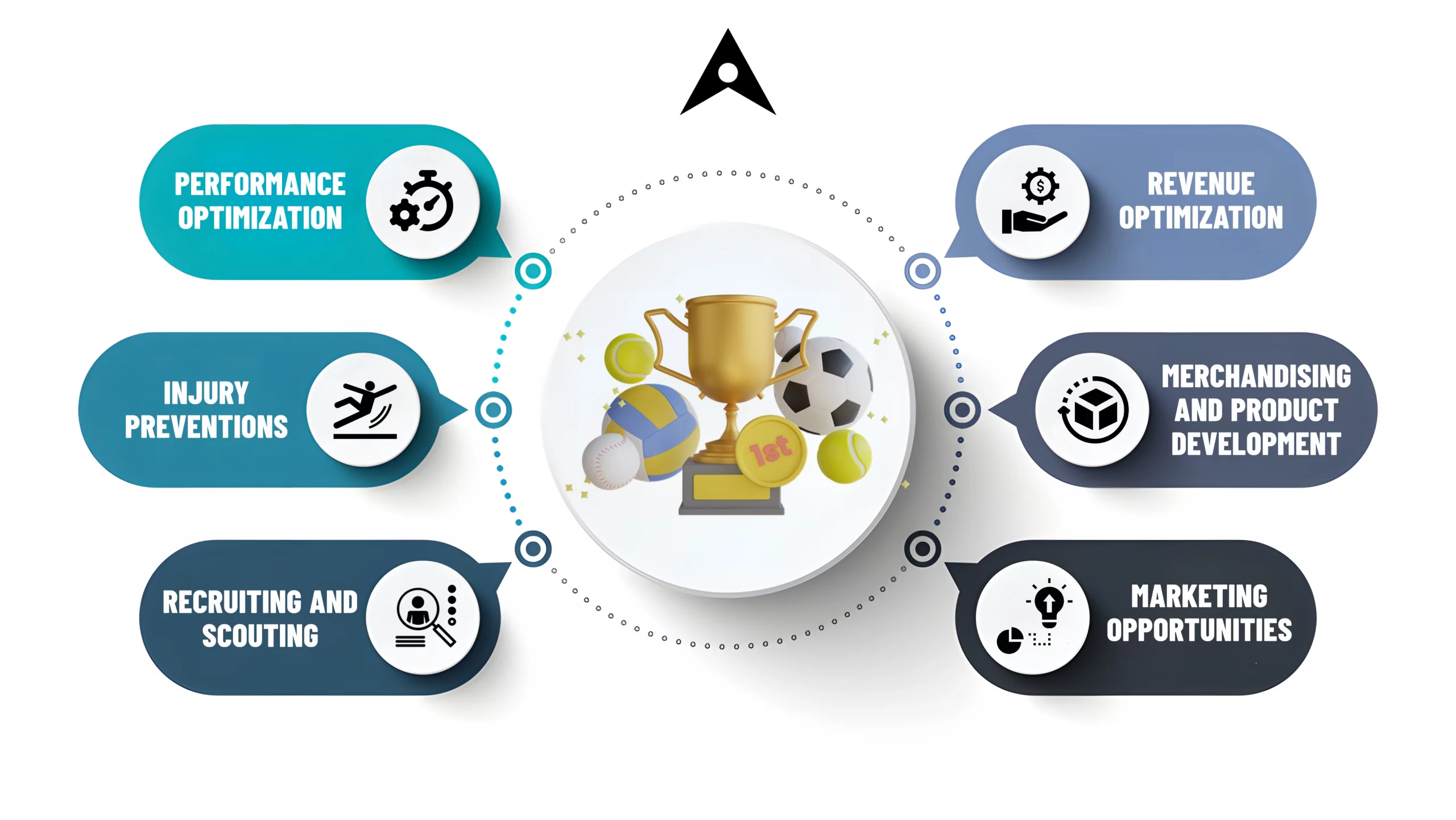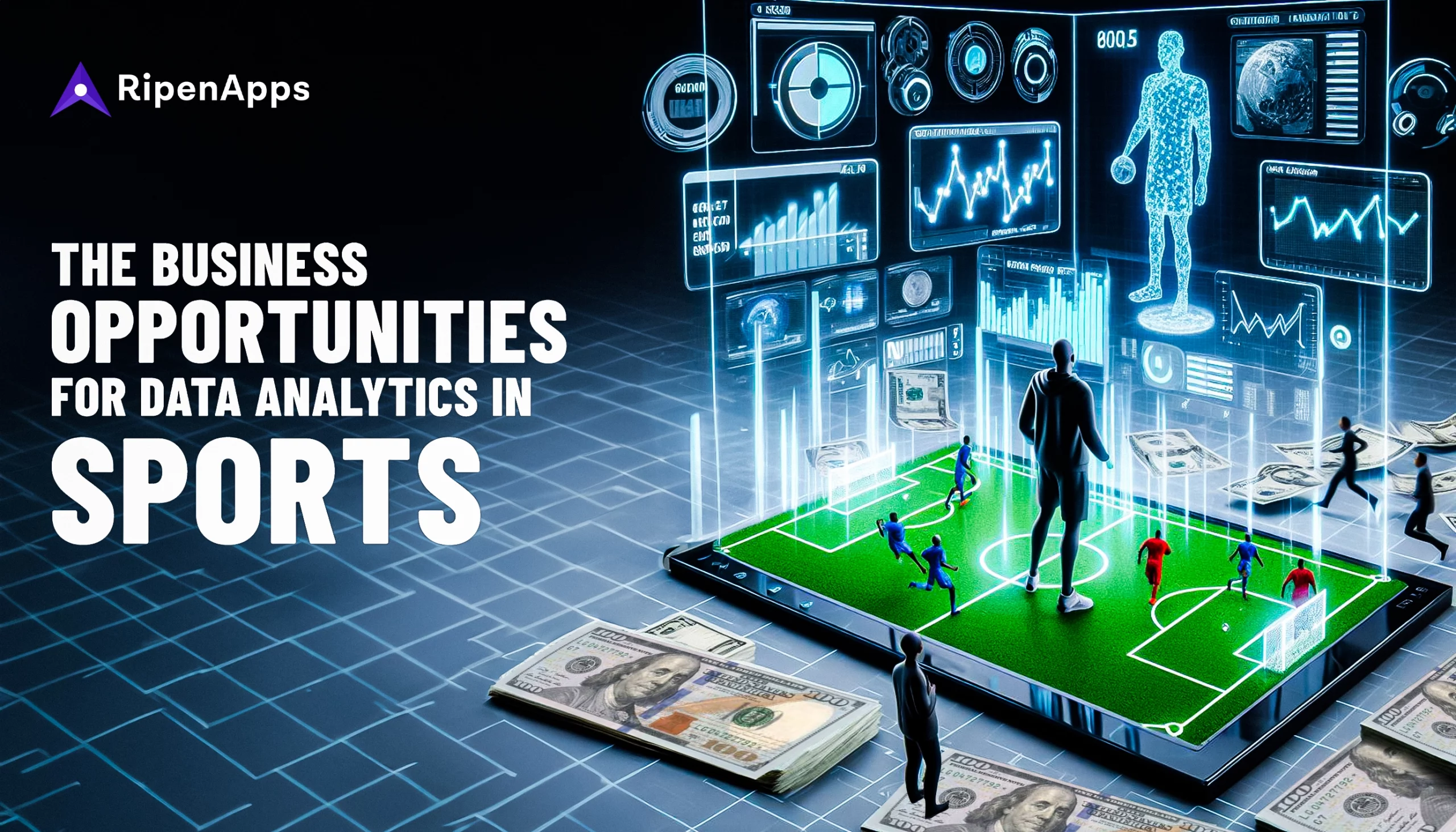Sports companies are seeking new ideas and innovative features. A feature like data analytics in sports gives sports business users to have a strategic methodology.
A report from Fortune Business Insights says that the global sports market has been forecasted to be $3.78 billion in 2023 and it can reach $22.13 billion by 2030.
The numbers mentioned above highlight how valuable is to have data analytics in sports apps. However, the whole procedure comes with its business opportunities and challenges.
In this blog, the main focus is to educate business owners about how valuable it can be for their business to implement data analytics. And also look out for the challenges it can come up with while implementing data analytics in sports.
Table of Contents
An Overview of Data Analytics in Sports
Data analytics in sports involves using data to understand and improve what happens on the field and behind the scenes.
- On-field analytics: This focuses on tracking important data during games to help teams make better decisions. It could be things like which soccer player has created the most opportunities or which player is the fastest. This helps coaches and players improve strategies and performance.
- Off-field analytics: This looks at the business side of sports, like ticket sales and fan engagement. By analyzing this data, teams can make smarter decisions to grow their fan base and increase profits.
Overall, data analytics is like having a playbook for sports teams and businesses. It helps them understand what’s happening and make better choices to succeed. Just like how businesses use data to improve, sports, teams use it to win games and grow their fan base.
Why is Data Analytics Important in Sports?
Data analytics in sports is important because it uses technology to gather lots of detailed information about sports. This is a great help for sports teams and companies to make better decisions.
For example, data analytics in sports improves marketing and sells more tickets and merchandise. If you have good proof of data, you can attract sponsors and predict how future games might go using simulations.
These data help teams analyze players’ performance and determine what they need to do to get better. Data analytics features in a sports app, help coaches to create a strategy by knowing their team’s strengths and weaknesses.
Business Opportunities of Data Analytics in Sports Industry

Using data analytics in sports opens up many business opportunities by providing helpful information for teams, organizations, and people involved.
Here are some ways data analytics in sports:
Performance Optimization
If there is a solution from where you can analyze the performance. Data analytics in sports app development means closely studying player and team stats to make them better overall.
By using insights from data, teams can customize training plans based on what each player is good at and what they need to work on.
For instance, analyzing how players move and how fit they are helps coaches see where they can improve. Being able to track progress in real time and make changes during training sessions is a big help too.
Injury Preventions and Health Management
Using data analytics in sports helps keep athletes healthy and prevents injuries. By analyzing data, coaches can better understand and reduce the chances of health issues.
Data analytics in sports also helps manage athletes’ workloads and keeps an eye on them constantly. With this coaches can make training plans tailored to each athlete.
Recruiting and Scouting
Recruiting the best players is a major focus in sports. Using data analytics in sports makes this process easier by helping teams scout and recruit players more effectively. It involves keeping track of players’ performances and comparing them with others in different leagues. This way, teams can make smarter decisions about who to bring onto their team, relying less on personal opinions and old-fashioned scouting methods.
Revenue Optimization
Setting the right prices and maximizing revenue is a big deal for sports companies. They use data analytics to figure out what fans want and how much they are willing to pay for tickets.
This means looking at things like how old fans are, where they live, and when they buy tickets to understand who they’re trying to attract and how competitive they need to be with their prices.
By studying past data, they can see trends like which games draw the biggest crowds and when demand goes up or down. This helps them decide on prices that work well compared to other sports events.
Merchandising and Product Development
Nowadays, every team has their merchandise and products. So, that their fans can buy them and it also helps in differentiating between the teams. By looking at past purchases and understanding customer opinions, experts can learn a lot and use this knowledge to stay ahead.
Data analytics in sports for merchandise help them understand what’s popular in the market and adjust their products accordingly.
For example, using data from sports events can help companies create merchandise that fans will love, building strong loyalty among sports fans.
Marketing Opportunities
If you have data analytics in sports apps, then it can attract sponsors and increase revenue opportunities in marketing. Measuring metrics like social media engagement and viewership helps understand the brand’s exposure. With this, you can get the potential audience.
Challenges That Businesses Face for Data Analytics in Sports

Exposure to data analytics in the sports industry does not just come with benefits but also has some challenges. We should be prepared before starting the sports app development process.
Data Quality and Availability
For effective data analytics in sports two factors are necessary, first is quality data and second is availability. Businesses encounter, difficulty in accessing proper data and that can result in wrong data analysis.
These issues can occur due to wrong data entry, or technical problems. Reliable data analytics in sports needs a reliable advanced sports app. A business needs to implement the best data management practices with a skilled team.
Resistance to change
If you are implementing data analytics in sports app development, then it should be adaptable to the industry changes. A traditional methodology often creates challenges as coaches, players, and staff may be hesitant owing to the trust they gained from their experience.
All the users are deeply rooted conventional approaches restrict them from shifting towards data-driven decision-making. Accurate data-centric results help coaches and players to train better.
Cost Concern
The cost of sports app development can be high or low, depending on the features you will be integrating into it. A great feature that is supposed to help the users is data analytics and it does come with cost.
The whole development process comes with a cost, and implementing any features should be in your budget. There are other challenges as well including cost concerns is data security.
Communication and Collaboration
To work well together and communicate effectively, is important for data analysts and sports professionals. Sometimes they struggle to share information and act on suggestions because of busy schedules and other workloads.
Another challenge is that not everyone involved in sports understands data analysis as well as the analysts do. This can make it hard for them to fully grasp what the data is saying.
Read More: The Role of Artificial Intelligence in Sports App Development
Final Thoughts
The usage of data analytics in sports industry is important. It changes how teams play, and how everybody predicts the future.
All the sports app gets a large number of data to create a structure. Manually collecting the data can be a challenging task. It can lack the proper mentioning and adding the stats because the whole analytics helps in the future strategies.
It can be tough to integrate the right algorithms for data analytics in your sports app. But you can get help from a sports app development company. They can help in the proper alignment of the features.
FAQs
Q1. How to use data analytics in sports?
To get the proper analysis of the sports for teams and organziation, it needs to collect the relevant data. Those datas can be collected through various sources, like wearable devices, video footage, and fan interactions.
All the collected data is then processed and analyzed using the advance data analytics in sports apps through patterns, trends, and insights. These analysis helps the plan future strategies and decision making.
Q2. Why is data analytics so important in sports?
Data analytics is crucial in sports because it provides teams and organizations with the ability to make data-driven decisions that can significantly impact performance, fan engagement, and revenue generation.
Through data analytics users can identify,
- Strengths
- Weaknesses
- Performance
- Injury risks
- Recruit top talents
- Effect fans engagement
- Maximize revenue
The ability to harness the power of data analytics in sports is essential for achieving success and staying ahead of the competition.
Q3. What are the market trends of data analytics in sports?
There are multiple different trends going on in the market, like cloud solutions, AI-powered solutions, and tracking solutions. All these kinds are also being implemented in the sports industry for a better and enhanced feeling. Some of them helps in data analytics in sports to attract businesses to meet their targets.












 India
India USA
USA Australia
Australia Canada
Canada UK
UK UAE
UAE